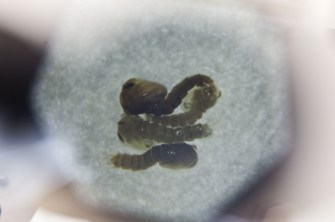Human DNA Will Be Synthesized Within 5 Years, Prominent Geneticist States

The Human Genome Project (HGP) was the most ambitious and sweeping scientific analysis of our DNA, ever. Just a reminder, a genome is a complete set of instructions or DNA, the blueprints for building an entire organism. The project brought countless findings, which are just beginning to shape medicine and society.
Yet, something else has become quite clear. Being able to “read” our DNA doesn’t mean you know everything about it. To further develop understanding, a new program seeks to write whole genomes from scratch, including plant, microbe, animal, and even human DNA. But that last one is creating a firestorm of controversy over whether we should be doing it at all.
Today, we have the entire human genome laid out before us, around three billion base pairs total. These are adenine (A), cytosine (C), guanine (G), and thymine (T). When snapped together, they form the iconic double helix we’re all familiar with. The genome is so complex, there’s a lot we just don’t know or even understand about it. For instance, we still aren’t sure how these base pairs work alongside one another.

Wikipedia Commons.
So how can genetics move forward? You don’t really understand something inside and out without taking it apart, putting it back together, and making it yourself. As the renowned physicist Richard Feynman once said, “What I cannot create, I do not understand?”
Using the information locked in the nucleotides, the ultimate goal is to be able to manipulate our genome and those of other organisms, to suit human needs. These include curing disease, producing more and healthier food, and someday perhaps, enhancing the human body beyond its current capabilities. Going down this road raises all kinds of ethical questions, however.
Because of this, over 100 experts from all over the world met in secret last year at Harvard Medical School. Attendees were asked not to share what had taken place at the meeting. Some scientists snubbed the event, since the press wasn’t invited, even though ultimately, reporters found out and it was plastered all over the internet. The point was to create what came to be known as, the Human Genome Project-Write (GP-Write).
Around 250 researchers met again in New York City on May 9-10 of this year. Event attendees discussed logistics, ethics, and applications surrounding the project. The group behind GP-Write is now seeking $100 million for the first thrust of their project. Since the closed door session last year and the criticism it garnered, scientists are more open about the project now. They’ve even published an article and a white paper, explaining their proposal in detail.

One of the fears is that such technology will lead to “designer babies.” Getty Images.
Jef Boeke is one of the scientists leading the project. He is the director of the Institute for Systems Genetics at New York University. Dr. Boeke recently announced that GP-Write will be able to create artificial human DNA within 4-5 years.
Some geneticists think Dr. Boeke’s timeline is too ambitious. But most agree that we’ll create an artificial organism within the next decade. What are the benefits? Consider 3D printing organs for transplant, eliminating the donor waiting list. Or engineering an immune cell to combat something like an Ebola outbreak more effectively. It may also help us better understand and someday eliminate the role of genes in the development of diseases.
Knowledge acquired through GP-Write could ultimately allow scientists to make human cells resistant to infection, radiation, and even cancer. The results might also lead to new drugs, advanced stem cell therapy, novel gene therapies, and even new biofuels.
To create an organism from scratch, innovative techniques will have to be devised. One thing scientists can’t do yet is, take whole sections of DNA and connect them in the right places. CRISPR-a9 or gene editing, will likely help to devise other, similar techniques. Once researchers have artificial chromosomes, they’ll inject them into hollow cells and see if they start dividing.

We could design other organisms too, like mosquitoes who can no longer carry dangerous bacteria. Getty Images.
Preliminary experiments are already underway. Critics argue that such efforts could lead to designer babies. Here, certain traits like skin color, height, sex, appearance, and intelligence would be selected by prospective parents. After the outrages propagated by eugenicists and the Nazis during World War II, trying to build a “master race,” one isn’t so baffled by such concerns. There’s even worry over the possibility of patenting genes. Income inequality wouldn’t hold a candle to biologically designed inequality, now would it?
Something else that’s worrisome, scientists might accidentally create a new genetic disease that could enter the genome and be passed down to future generations. Or, artificially designed cells could get out and wreak havoc in the environment. Dr. Boeke is no longer shying away from public concerns. Now he invites comment. Francis Collins is the director of the US National Institutes of Health. He said, “Moving beyond reading DNA to writing DNA is a natural next step.” But he also cautioned that input and discussion with the public is critical.
This is not only to clear up misinformation and garner input but to help shape what regulations should be in place. Just like with other breakout technologies, the innovation seems to be outpacing regulatory efforts. So far, the US has no coordinated biotech policy in place.
Besides controversy, the other stumbling block is cost. The current projection is $.10 per base pair. With three billion of them, the cost quickly adds up. The Human Genome Project cost $3 billion and took 13 years to complete. Should they receive appropriate funding, renowned geneticist George Church at Harvard University, will launch an experiment. He will be heading the program along with Dr. Boeke.
To learn more about GP-Write, click here:





